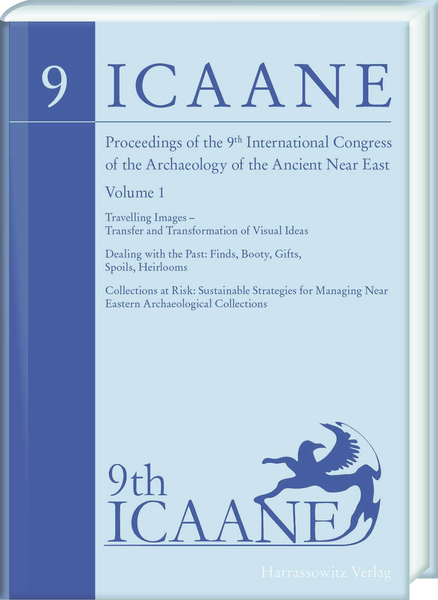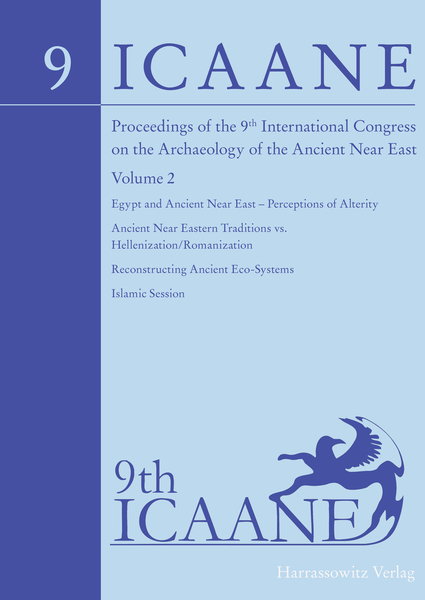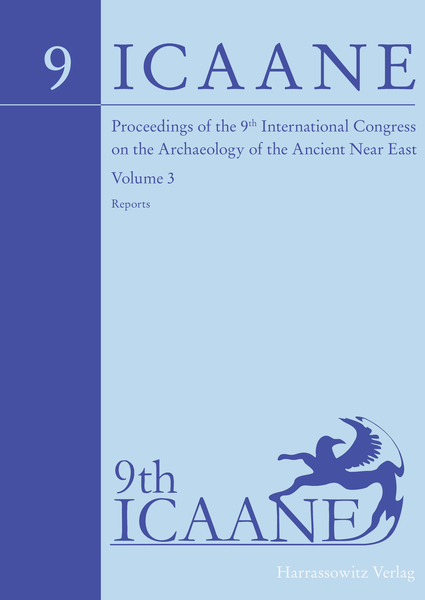9th ICAANE Basel 2014
The 9th International Congress on the Archaeology of the Ancient Near East (ICAANE), Basel (Switzerland), June 9-13, 2014, is over. For generously supporting the event the Basel Organizing Committee would like to thank:
- the Isaac Dreyfus-Bernheim Stiftung
- the Max Geldner-Stiftung.
- the Freiwillige Akademische Gesellschaft Basel
- the Swiss National Science Foundation, Berne,
as well as
- the Government of Basel-Stadt
- the Government of Basel-Landschaft
- the UBS Culture Foundation
- the Faculty of Theology of the University of Basel
- the Fonds für Förderung der Studien auf dem Gebiet der ägyptologischen, orientalischen und klassischen Altertumskunde
- an anonymous donor.
Round-ups of this week written by some of the participants may be found here: 1 and 2.
Thanks for that!
The Basel Organizing Committee also thanks all the participants for their contributions.
The Proceedings have been published in three volumes by the Harrassowitz Publishing House: Proceedings of the International Congress on the Archaeology of the Ancient Near East. Proceedings of the 9th ICAANE June 9th -13th, University of Basel, 3 vols, ed. by Stucky, Rolf A. / Kaelin, Oskar / Mathys, Hans-Peter, Wiesbaden 2016.



Sections/Themes
The congress had 7 thematic sections, 14 workshops, and a poster session. See here for the programme and the abstracts.
1. Egypt and Ancient Near East – Perceptions of Alterity
Theme Organiser: Prof. Dr. Susanne Bickel
In the cultural and political interplay of the Ancient Near East, Egypt had a significant part during most periods. Due to Egypt's strong affirmation of cultural specificity and its frequent claim for political supremacy, the perception of the others individually and collectively was on both sides a perception of marked difference. The perception of alterity was expressed, often in standardized form, in texts and images. But, what does the archaeological material tell us about the understanding or the classification of the other(s)? What reactions did contact with others and perception of alterity provoke? How did it influence and shape material culture? Interest, rejection, or emulation could be possible schemes of reaction.
2. Travelling Images – Transfer and Transformation of Visual Ideas
Theme Organiser: Dr. Oskar Kaelin
Images are created to express ideas. They are created in a specific cultural and ideological environment to transmit a message (political, social, even emotional) understandable to their respective addressees. But ambiguities are usually immanent and changes of meaning happen: by time, by the transfer from one cultural context to another, or from one culture to another.
This theme aims at exploring the phenomenology of iconographic transformation in intercultural contact, the adoption, adaptation and translation of images, and changes of meaning, which took place in the course of their transmission into new contexts, but also the reasons for their refusal.
3. Ancient Near Eastern Traditions vs. Hellenization/ Romanization
Theme Organiser: Prof. Dr. Bruno Jacobs
Already with respect to Achaemenid court art it has been controversially discussed, to what extent Near Eastern traditions or Hellenic impact were prevailing. But in the Achaemenid epoch Hellenization - as much later also Romanization - obviously stayed to be a phenomenon only exceptionally radiating as far east as Fars. After the downfall of the Achaemenid Empire, however, Hellenization spread all over its former realm as far as Bactria and even beyond the Indus coming across numerous highly divergent native traditions. Contributors to this theme are invited to describe the play of forces of native traditions and western impact in all relevant regions and epochs and with regard to the very divergent results of this encounter in the various categories of material culture. The scope of research includes the whole territory from the Mediterranean to the Ganges, including the zone of the steppes, and the timespan from the early Achaemenid to the end of the Sasanian epoch.
4. Reconstructing Ancient Eco-Systems
Theme Organiser: Prof. Dr. Jean-Marie Le Tensorer
Archaeology of the Near East has great interest in ecological, environmental and cultural relationships. Current archaeological research is definitely interdisciplinary and has to include, beyond the excavated material culture, all information available for ecosystem reconstruction. Possible sub-themes are: Chronological and spatial distribution of environmental factors (framework) - Technological evolution in relation to change in the natural environmental context - Changes in residential and settlement patterns - Organization of the economy of natural resources - Localization of the sites in relation to ecosystems - Interrelationships between economic activities, climatic and demographic change and land use (Economic and social organization) - Architecture in relation to the structure of raw material distribution, trade routes and population distribution - Diet (animal and plant use) in relation to ecosystems - Anthropological traits - Methodological developments in reconstructing ancient ecosystems.
5. Dealing with the Past: Finds, booty, gifts, spoils, heirlooms
Theme Organiser: Prof. Dr. Rolf Stucky
Papers submitted for this session will deal with the revival and survival of ancient material and objects outside of their original contexts. Instances of revival are furnished by items of the past, which were found occasionally, or by systematic search for them (e.g. foundation deposits). A well-known example of survival is the presentation of pieces of booty, which were taken from defeated neighbours and showcased in the ambience of temples, palaces and treasuries, to demonstrate the own reach of power. The same purpose served objects once gifted and held in high esteem over generations. Other paradigms of survival are the re-use of spolia in new contexts, especially in architecture, or the continuous usage of time-honoured objects, e.g. of seals and jewellery.
Besides the description of the handling of the respective objects, as perceptible from the archaeological record, the contributions to this theme should aim at the knowledge, which was associated to them. Also contributions, which scrutinize our modern approach to objects from the Ancient Near East, are welcome.
6. Excavation Reports and Summaries in Near Eastern Archaeology
In this section we invite reports on field research projects (in progress or recently terminated), or publication of material of older excavations (19th to mid 20th century AD). The lectures will be arranged by country and region of the fieldwork. Please note that only one progress report per project will be accepted.
7. Islamic Session
Theme Organiser: Dr. Denis Genequand
Islamic archaeology has become an established part of the ICAANE series and an Islamic session will be organised in Basel. Presentations and papers on Islamic Archaeology in the Near East that fit into the five main congress themes will be scheduled and presented there. Papers that do not fit into the themes will be collected together in this general session on Islamic archaeology. Geographically, the Islamic sessions will cover the same areas as the main conference. Historically, papers may investigate periods as late as the Ottoman era.
Organisers
9th ICAANE Basel Organising Committee
Prof. Dr. Antonio Loprieno - Professor of Egyptology, Rector of the University of Basel
Prof. Dr. Susanne Bickel - Professor of Egyptology, University of Basel
Dr. Denis Genequand - Service d'archéologie, University of Geneva
Prof. Dr. Bruno Jacobs - Professor of Ancient Near Eastern Studies, University of Basel
Dr. Oskar Kaelin - Ancient Near Eastern Studies, University of Basel
Prof. Dr. Jean-Marie Le Tensorer - Professor of Prehistorical Archaeology, University of Basel
Prof. Dr. Hans-Peter Mathys - Professor of Old Testament Studies and Semitic Languages, University of Basel
Prof. Dr. Rolf A. Stucky - Professor of Classical Archaeology, University of Basel
Further Support
Dr. Ueli Brunner - Lecturer, Researcher in South Arabia, Department of Geography, University of ZurichM.A. Gino Caspari - Near Eastern Archaeologist, Logo Design
Dr. Rita Gautschy - Researcher, Astronomy and Antiquity, University of Basel
ICAANE International Scientific Committee
Prof. Dr. Manfred Bietak - University of Vienna
Prof. Dr. Hartmut Kühne - Free University of Berlin
Prof. Dr. Jean-Claude Margueron - École Pratique des Hautes Études, Paris
Dr. Wendy Matthews - Reading University
Prof. Dr. Paolo Matthiae - University of Rome La Sapienza
Prof. Dr. Diederik Meijer - University of Leiden
Prof. Dr. Ingolf Thuesen - University of Copenhagen
Prof. Dr. Alan Walmsley - University of Copenhagen
Prof. Dr. Irene Winter - Harvard University
Islamic Archaeology
Dr. Alison Gascoigne - University of Southampton
Dr. Cristina Tonghini - Università Ca' Foscari, Venezia
Dr. Donald Whitcomb - University of Chicago
Quick Links
Social Media
